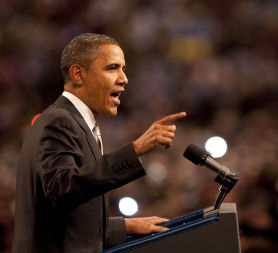Obama woos the women’s vote
They’re the most important voters in the Democratic party base. Now President Obama is reaching out to women in an all-out effort to win over crucial support, writes Felicity Spector.

As part of his swing through four western states – Obama will hold one of his home-style ‘back yard’ events – chatting to local women in Seattle, focussing on economic issues. He’ll then hold a rally for Senator Patty Murray – who won her seat in 1992 as a “mom in tennis shoes”.
He’s also getting key women from his administration out on TV and radio to push the message that millions of women have benefited from White House initiatives, from small business programmes to healthcare reform.
And to back it all up, his National Economic Council has just produced a report claiming that White House policies over the last two years have benefited women. The very first bill that President Obama signed, it points out, was the Lilly Ledbetter Fair Pay Act.
“They do not think the administration’s economic policies are working for their families, and worry about the priorities of this administration, and wonder if they get it.” Democratic pollster Celinda Lake
Conference call
In a conference call to reporters – top advisor Valerie Jarrett warned that the impact of Republican efforts to repeal health care and financial regulatory reforms would be “devastating”.
The First Lady Michelle Obama is doing her own high-profile campaigning – although she’s concentrated on a deliberately traditional image as “mom in chief” – declaring her children were her “first priority” and the centre of her world.
There’s been a lot of talk about the Democrats’ “enthusiasm gap” – amid flagging support for both the party and the President ahead of next month’s midterm elections. Young people, black voters, women – they all helped propel Obama into the White House in 2008 – now they’re either unmotivated or undecided.
Polls show that women – who make up a majority of the electorate have traditionally tended to lean Democrat, and that they’re more likely than men to turn out at the polls.
House of Representatives
In House races – where the Democrats are widely tipped to lose dozens of seats – womens’ support for the party has been, on average, nine points higher than for the Republicans. Four years ago the margin was 12 points: this time, though, they’re evenly split.
Democratic pollster Celinda Lake told the Washington Post women are more worried about the state of the economy.
“They do not think the administration’s economic policies are working for their families, and worry about the priorities of this administration, and wonder if they get it.”
Experts say the way the recession has mapped out means that men were affected first: industries like construction and manufacturing suffered the initial job cuts – now it’s spread to the public sector – which means more women are facing redundancy.
Some of the Obama stimulus cash went on preventing any further job losses in areas like teaching.
But Professor Mary King from Portland State said: “Yes, there was an impact, but not so big that people perceive it. They don’t realise what would’ve happened if that spending hadn’t occurred.”
Making the running
Despite the apparent disillusion among women voters, it seems women candidates are making all the running. Perhaps it’s the Sarah Palin effect – but the would-be politicians capturing the public imagination, or at the very least, the airtime – are the likes of Tea Party supporters Christine O’Donnell and Sharon Angle – who famously told her opponent, Senate majority leader Harry Reid to ‘man up’, during a recent debate. Then there’s an ultra conservative who’s 8 months pregnant, a wrestling executive – and a 28 year old Democratic hopeful called Krystal Ball, who delivered a feisty defence of her right to run for office, after pictures showing her sucking a dildo were published on the internet.
Perhaps it’s a sign of the unexpectedly large number of close races this year which mean all sorts of candidates are suddenly making the running, who’d never have been in with a chance in a less typical year. Or perhaps – after her unsuccessful bid for the White House back in ’08 – Hillary Clinton’s “18 million cracks in the glass ceiling” did help put women on the road to success, after all.